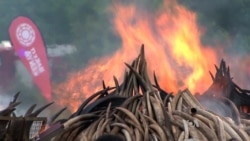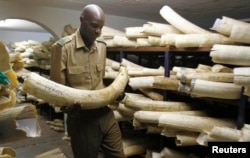Huge orange flames and plumes of smoke filled the air at Nairobi National Park in April, a sobering image as 105 tons of elephant ivory and 1.35 tons of rhino horn were destroyed.
Kenya conducted the event to demonstrate that ivory has no value to anyone except elephants. President Uhuru Kenyatta pledged his country's support for a complete ban of the ivory trade at the conference for the global conservation body known as CITES, which opens Saturday in Johannesburg, South Africa.
CITES, the Convention on International Trade in Endangered Species, is expected to make a determination on whether countries in Africa should destroy seized ivory or be allowed to sell it to fund conservation efforts. The question has sparked heated debate on the continent, with some arguing that the future of elephants is at stake.
"Our philosophy has been to burn the entire stockpile,” said Judy Wakhungu, Kenya's Cabinet secretary for the Ministry of Environment, Water and Natural Resources, “because this is one way of demonstrating to the world that if you offer trade in ivory, we give the misimpression that, actually, ivory is available. And yet it's this very ivory that's endangering our species."
Tens of thousands of elephants have been killed in recent years for their ivory, as a result of strong demand from Asian markets. The recent "Great Elephant Census" showed a 30 percent decline in African savanna elephants between 2007 and 2014.
About 30 African countries, including Kenya, want a comprehensive ban on all international trade in ivory.
"Nobody should buy ivory in the world," said Paul Udoto, corporate communications manager for the Kenya Wildlife Service.
Request to sell
Namibia and Zimbabwe have officially requested through CITES the right to sell their ivory stockpiles. Along with South Africa, these countries say they want to put the proceeds toward conservation efforts.
Zimbabwe's finance minister, Patrick Chinamasa, suggested to parliament in July that there could be other uses for the funds from ivory sales.
“We have $9.6 billion worth of ivory in the country, sufficient to write off our debt,” Chinamasa said. “So this is the paradox of Africa. Rich Africa, poor Africans. Because the policies are coming from outside, and imposed on us. They don't have elephants, but they become members of CITES to ban and stop us from disposing of our own assets.”
South Africa says destroying ivory makes it scarcer, upping the black market price and driving more poaching.
‘For the good of the elephants’
Kenya argues that previous "one-time" sales have demonstrated the opposite is true, and that opening up trade for some countries puts elephants across the continent at risk.
"It is very, very hard to distinguish between legal and illegal ivory," said Philip Muruthi, vice president of species conservation at the African Wildlife Foundation. "And that means that having a legal supply of ivory in the market perpetuates the killing. And so, the cycle continues. Where you have trade, you have benefits going to a few kingpins, and you deny livelihoods to communities, and the populations continue to suffer."
Muruthi also emphasized the importance of a united African voice during the upcoming CITES talks.
"I know there are challenges, but I do believe an agreement will be found and it will be found for the good of the continent. It will be for the good of the elephants, and for the many, many communities and national economies that depend on elephants," he said.
Although elephants are the top issue for Africa at the CITES talks, trade restrictions and allowances for close to 500 other plant and animal species — including pangolins, tigers, snakes, sharks and rosewood — will also be on the table.
Sebastian Mhofu contributed to this report.







